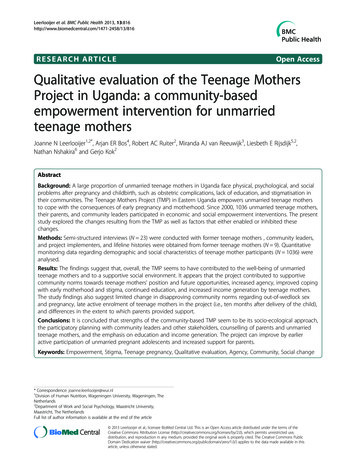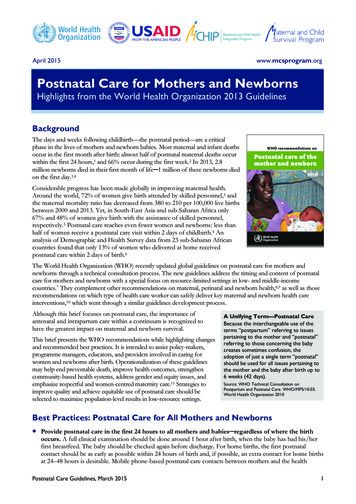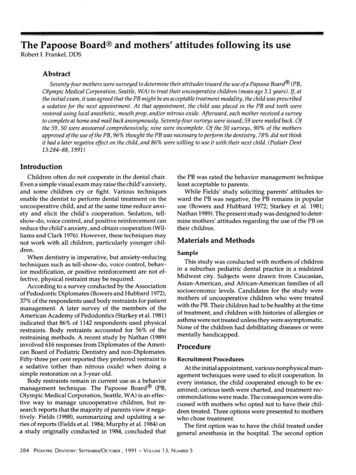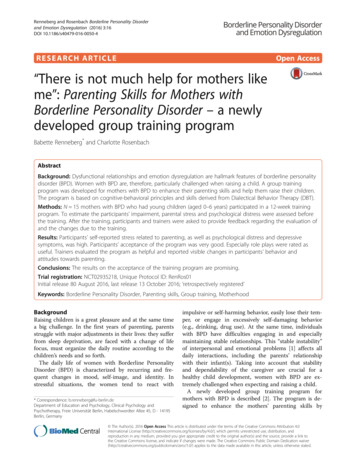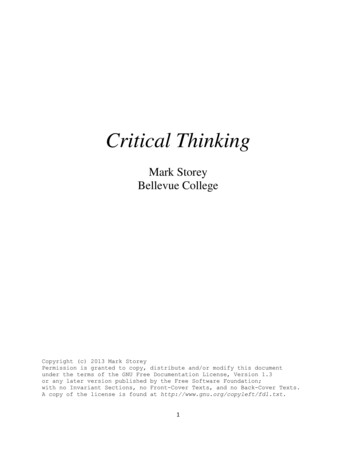
Transcription
Alice WalkerIn Search oj Our Mothers' GardensI described her own nature and temperament. Told how they needed a larger lifefor their expression. . I pointed out that in lieu of proper channels, her emo tions had overflowed into paths that dissipated them. I talked, beautifully Ithought, about an art that would be born, an art that would open the way forwomen the likes of her. I asked her to hope, and build up an inner life against thecoming of that day. . I sang, with a strange quiver in my voice, a promisesong.-]ean Toomer, "Avey," CaneThe poet speaking to a prostitute who falls asleep while he's talkingWhen the poet Jean Toomer walked through the South in the earlytwenties, he discovered a curious thing: black women whose spirituality wasso intense, so deep, so unconscious, that they were themselves unaware of therichness they held. They stumbled blindly through their lives: creatures soabused and mutilated in body, so dimmed and confused by pain, that theyconsidered themselves unworthy even of hope. In the selfless abstractionstheir bodies became to the men who used them, they became more than"sexual objects," more even than mere women: they became "Saints." Insteadof being perceived as whole persons, their bodies became shrines: what wasthought to be their minds became temples suitable for worship. These crazySaints stared out at the world, wildly, like lunatics-or qUietly, like suicides;and the "God" that was in their gaze was as mute as a great stone.Who were these Saints? These crazy, loony, pitiful women?Some of them, without a doubt, were our mothers and grandmothers.In the still heat of the post-Reconstruction South, this is how they seemedto Jean Toomer: exquisite butterflies trapped in an evil honey, toiling awayThis essay first appeared in Alice Walker, In Search oj Our Mothers' Gardens (New York, 1972).
402Alice Walkertheir lives in an era, a century, that did not acknowledge them, except as "themule of the world." They dreamed dreams that no one knew-notthemselves, in any coherent fashion-and saw visions no one couldstand. They wandered or sat about the countryside crooning lullabies toghosts, and drawing the mother of Christ in charcoal on courthouse walls.They forced their minds to desert their bodies and their striving spir- .its sought to rise, like frail whirlwinds from the hard red clay. And whenthose frail whirlwinds fell, in scattered particles, upon the ground, no onemourned. Instead, men lit candles to celebrate the emptiness that remained,as people do who enter a beautiful but vacant space to resurrect a God.Our mothers and grandmothers, some of them: moving to music not yetwritten. And they waited.They waited for a day when the unknown thing that was in them would bemade known; but guessed, somehow in their darkness, that on the day oftheir revelation they would be long dead. Therefore to Toomer they walked,and even ran, in slow motion. For they were going nowhere immediate, andthe future was not yet within their grasp. And men took our mothers andgrandmothers, "but got no pleasure from it." So complex was their passionand their calm.To Toomer, they lay vacant and fallow as autumn fields, with harvest timenever in Sight: and he saw them enter loveless marriages, without joy; andbecome prostitutes, without resistance; and become mothers of children,withou t fulfillment.For these grandmothers and mothers of ours were not Saints, but Artists;driven to a numb and bleeding madness by the springs of creativity in themfor which there was no release. They were Creators, who lived lives ofspiritual waste, because they were so rich in spirituality-which is the basisof Art-that the strain of enduring their unused and unwanted talent drovethem insane. Throwing away this spirituality was their pathetic attempt tolighten the soul to a weight their work-worn, sexually abused bodies couldbear.What did it mean for a black woman to be an artist in our grandmothers'time? In our great-grandmothers' day? It is a question with an answer cruelenough to stop the blood.Did you have a genius of a great-great-grandmother who died under someignorant and depraved white overseer's lash? Or was she required to bakebiscuits for a lazy backwater tramp, when she cried out in her soul to paintwatercolors of sunsets, or the rain falling on the green and peaceful pasture-In Sear. cis? Or was her body broken and forced tten than not sold away from her)-eighthen her one joy was the thought of modelone or clay?How was the creativity of the black worn:entury after century, when for most of themerica, it was a punishable crime for a bI;e freedom to paint, to sculpt, to expand ttConsider, if you can bear to imagine it, wIsinging, too, had been forbidden by law. LisBillie Holiday, Nina Simone, Roberta Flae. (hers and imagine those voices muzzled mp;ehend the lives of our "crazy," "Sain'The agony of the lives of women who mEssayists, and Short-Story Writers (over,with their real gifts stifled within them. And, if this were the end of the story, we'paraphrase of Okot p'Bitek's great poem:0, my clanswomenLet us all cry together!Come,Let us mourn the deathThe death of a QueenThe ash that was produBy a great fire!0, this homestead is utClose the gatesWith lacari thorns,For our motherThe creator of the StooAnd all the young wonHave perished in the \\But this is not the end of the story, for aand grandmothers, ourselves-have not pIask ourselves why, and search for and finlall efforts to erase it from our minds, justAmerican women are.
It did not acknowledge them, except as "the:led dreams that no one knew-not evenion-and saw visions no one could under out the countryside crooning lullabies toIf Christ in charcoal on courthouse walls.esert their bodies and their striving spir lwinds from the hard red clay. And whenIttered particles, upon the ground, no ones to celebrate the emptiness that remained,1but vacant space to resurrect a God.'S, some of them: moving to music not yetunknown thing that was in them would behow in their darkness, that on the day ofIg dead. Therefore to Toomer they walked,. they were going nowhere immediate, andir grasp. And men took our mothers andre from it." So complex was their passionfallow as autumn fields, with harvest time:nter loveless marriages, without joy; and:tance; and become mothers of children,lthers of ours were not Saints, but Artists;.dness by the springs of creativity in themThey were Creators, who lived lives ofso rich in spirituality-which is the basistheir unused and unwanted talent drovespirituality was their pathetic attempt toYork-worn, sexually abused bodies couldman to be an artist in our grandmothers'lay? It is a question with an answer cruelgreat-grandmother who died under someseer's lash? Or was she required to bake" when she cried out in her soul to paint'alling on the green and peaceful pasture-TjtIn Search of Our Mothers' Gardens40 3lands? Or was her body broken and forced to bear children (who were moreoften than not sold away from her)-eight, ten, fifteen, twenty children when her one joy was the thought of modeling heroic figures of rebellion, instone or clay?How was the creativity of the black woman kept alive, year after year andcentury after century, when for most of the years black people have been inAmerica, it was a punishable crime for a black person to read or write? Andthe freedom to paint, to sculpt, to expand the mind with action did not exist.Consider, if you can bear to imagine it, what might have been the result ifsinging, too, had been forbidden by law. Listen to the voices of Bessie Smith,Billie Holiday, Nina Simone, Roberta Flack, and Aretha Franklin, amongothers, and imagine those voices muzzled for life. Then you may begin tocomprehend the lives of our "crazy," "Sainted" mothers and grandmothers.The agony of the lives of women who might have been Poets, Novelists,Essayists, and Short-Story Writers (over a period of centuries), who diedwith their real gifts stifled within them.And, if this were the end of the story, we would have cause to cry out in myparaphrase of Okot p'Bitek's great poem:0, my clanswomenLet us all cry together!Come,Let us mourn the death of our mother,The death of a QueenThe ash that was producedBya great fire!0, this homestead is utterly deadClose the gatesWith lacari thorns,For our motherThe creator of the Stool is lost!And all the young womenHave perished in the wilderness!But this is not the end of the story, for all the young women-our mothersand grandmothers, ourselves-have not perished in the wilderness. And if weask ourselves why, and search for and find the answer, we will know beyondall efforts to erase it from our minds, just exactly who, and of what, we blackAmerican women are.
404Alice WalkerOne example, perhaps the most pathetic, most misunderstood one, canprovide a backdrop for our mothers' work: Phillis Wheatley, a slave in the17oos.Virginia Woolf, in her book A Room of Ones Own, wrote that in order for awoman to write fiction she must have two things, certainly: a room of herown (With key and lock) and enough money to support herself.What then are we to make of Phillis Wheatley, a slave, who owned noteven herself? This sickly, frail black girl who required a servant of her own attimes-her health was so precarious-and who, had she been white, wouldhave been easily considered the intellectual superior of all the women andmost of the men in the society of her day.Virginia Woolf wrote further, speaking of course not of our Phillis, that"any woman born with a great gift in the sixteenth century [insert "eigh teenth century," insert "black woman," insert "born or made a slave"] wouldcertainly have gone crazed, shot herself, or ended her days in .some ,lonelycottage outside the village, half witch, half wizard [insert "Saint"], leared andmocked at. For it needs little skill and psychology to be sure that a highlygifted girl who had tried to use her gift for poetry would have been sothwarted and hindered by contrary instincts [add "chains, guns, the lash, theownership of one's body by someone else, submission to an alien religion"Lthat she must have lost her health and sanity to a certainty."The key words, as they relate to Phillis, are "contrary instincts." For whenwe read the poetry of Phillis Wheatley-as when we read the novels of NellaLarsen or the oddly false-sounding autobiography of that freest of all blackwomen writers, Zora Hurston-evidence of "contrary instincts" is every where. Her loyalties were completely divided, as was, without question, hermind.But how could this be otherwise? Captured at seven, a slave of wealthy,doting whites who instilled in her the "savagery" of the Africa they "rescued"her from, one wonders if she was even able to remember her homeland as shehad known it, or as it really was.Yet, because she did try to use her gift for poetry in a world that made her aslave, she was "so thwarted and hindered by . contrary instincts, thatshe . lost her health." In the last years of her brief life, burdened notonly with the need to express her gift but also with a penniless, friendless"freedom" and several small children for whom she was forced to do stren uous work to feed, she lost her health, certainly. Suffering from malnutritionand neglect and who knows what mental agonies, Phillis Wheatley died.In SeSo torn by "contrary instincts" was bladher deSCription of "the Goddess"-as she pnot have-is ironically, cruelly humorous.ridicule for more than a century. It is usumemory as that of a fool. She wrote:The Goddess comes, she movesOlive and laurel binds her goldeWherever shines this native of tUnnumber'd charms and recenlIt is obvious that Phillis, the slave, c morning; prior, perhaps, to bringing inc'·····'M ·,· lunch. She took her imagery from the onothers.With the benefit of hindsight we ask, "1But at last, Phillis, we understand. Nostruggling, ambivalent lines are forced ornot an idiot or a traitor; only a sickly lithome and country and made a slave; a wosong that was your gift, although in a laneyour bewildered tongue. It is not so mucalive, in so many of our ancestors, the notiBlack women are called, in the folklore thsociety, "the mule of the world," becausethat everyone else-everyone else-refuse!"Matriarchs," "Superwomen," and "Mean"Castraters" and "Sapphire's Mama." Wheing, our character has been distorted; wh(we have been handed empty inspirationfarthest corner. When we have asked forIn short, even our plainer gifts, our lab knocked down our throats. To be an artilowers our status in many respects, rath(will be.Therefore we must fearlessly pull out 0with our lives the living creativity some aallowed to know. I stress some of them
In Search of Our Mothers' Gardensost pathetic, most misunderstood one, can:hers' work: Phillis Wheatley, a slave in theRoom of One's Own, wrote that in order for a;t have two things, certainly: a room of hereJugh money to support herself.f Phillis Wheatley, a slave, who owned notlck girl who required a servant of her own atious-and who, had she been white, wouldintellectual superior of all the women and[her day.speaking of course not of our Phillis, thatgift in the sixteenth century [insert "eigh Iman," insert "born or made a slave"] wouldt herself, or ended her days in -some lonelyfitch, half wizard [insert "Saint"], 'feared and:ill and psychology to be sure that a highly;e her gift for poetry would have been sotry instincts [add "chains, guns, the lash, theeone else, submission to an alien religion"],h and sanity to a certainty."to Phillis, are "contrary instincts." For wheneatley-as when we read the novels of Nellalng autobiography of that freest of all black-evidence of "contrary instincts" is every etely divided, as was, without question, herrise? Captured at seven, a slave of wealthy,:r the "savagery" of the Africa they "rescued"even able to remember her homeland as sheher gift for poetry in a world that made her a:i hindered by . contrary instincts, thatthe last years of her brief life, burdened noter gift but also with a penniless, friendlessdren for whom she was forced to do stren ealth, certainly. Suffering from malnutritiont mental agonies, Phillis Wheatley died.405So tom by "contrary instincts" was black, kidnapped, enslaved Phillis thather description of "the Goddess"-as she poetically called the Liberty she didnot have-is ironically, cruelly humorous. And, in fact, has held Phillis up toridicule for more than a century. It is usually read prior to hanging Phillis'smemory as that of a fool. She wrote:The Goddess comes, she moves divinely fair,Olive and laurel binds her golden hair.Wherever shines this native of the skies,Unnumber'd charms and recent graces rise. [My italics]It is obvious that Phillis, the slave, combed the "Goddess's" hair everymorning; prior, perhaps, to bringing in the milk, or fixing her mistress'slunch. She took her imagery from the one thing she saw elevated above allothers.With the benefit of hindsight we ask, "How could she?"But at last, Phillis, we understand. No more snickering when your stiff,struggling, ambivalent lines are forced on us. We know now that you werenot an idiot or a traitor; only a sickly little black girl, snatched from yourhome and country and made a slave; a woman who still struggled to sing thesong that was your gift, although in a land of barbarians who praised you foryour bewildered tongue. It is not so much what you sang, as that you keptalive, in so many of our ancestors, the notion of song.Black women are called, in the folklore that so aptly identifies one's status insociety, "the mule of the world," because we have been handed the burdensthat everyone else-everyone else-refused to carry. We have also been called"Matriarchs," "Superwomen," and "Mean and Evil Bitches." Not to mention"Castraters" and "Sapphire's Mama." When we have pleaded for understand ing, our character has been distorted; when we have asked for Simple caring,we have been handed empty inspirational appellations, then stuck in thefarthest comer. When we have asked for love, we have been given children.In short, even our plainer gifts, our labors of fidelity and love, have beenknocked down our throats. To be an artist and a black woman, even today,lowers our status in many respects, rather than raises it and yet, artists wewill be.Therefore we must fearlessly pull out of ourselves and look at and identifywith our lives the living creativity some of our great-grandmothers were notallowed to know. I stress some of them because it is well known that the
406Alice Walkermajority of our great-grandmothers knew, even without "knowing" it, thereality of their spirituality, even if they didn't recognize it beyond whathappened in the singing at church-and they never had any intention ofgiving it up.How they did it-those millions of black women who were not PhillisWheatley, or Lucy Terry or Frances Harper or Zora Hurston or Nella Larsenor Bessie Smith; or Elizabeth Catlett, or Katherine Dunham, either-bringsme to the title of this essay, "In Search of Our Mothers' Gardens," which is apersonal account that is yet shared, in its theme and its meaning, by all of us.I found, while thinking about the far-reaching world of the creative blackwoman, that often the truest answer to a question that really matters can befound very close.In the late 1920S my mother ran away from home to marry my father. Mar riage, if not running away, was expected of seventeen-year-old girls. By the - time she was twenty, she had two children and was pregnant with a third.Five children later, I was born. And this is how I came to know my mother:she seemed a large, soft, loving-eyed woman who was rarely impatient in ourhome. Her quick, violent temper was on view only a few times a year, whenshe battled with the white landlord who had the misfortune to suggest to herthat her children did not need to go to school.She made all the clothes we wore, even my brothers' overalls. She made allthe towels and sheets we used. She spent the summers canning vegetablesand fruits. She spent the winter evenings making quilts enough to cover allour beds.During the "working" day, she labored beside-not behind-my father inthe fields. Her day began before sunup, and did not end until late at night.There was never a moment for her to sit down, undisturbed, to unravel herown private thoughts; never a time free from interruption-by work or thenoisy inquiries of her many children. And yet, it is to my mother-and all ourmothers who were not famous-that I went in search of the secret of whathas fed that muzzled and often mutilated, but vibrant, creative spirit that theblack woman has inherited, and that pops out in wild and unlikely places tothis day.But when, you will ask, did my overworked mother have time to know orcare about feeding the creative spirit?The answer is so Simple that many of us have spent years discovering it. Wehave constantly looked high, when we should have looked high-and low.In Se,For example: in the Smithsonian Instithangs a quilt unlike any other in the wosimple and identifiable figures, it portraysconsidered rare, beyond price. Though it f,'makIng, and though it is made of bits aobviously the work of a person of powerffeeling. Below this quilt I saw a note that s.Black woman in Alabama, a hundred yeanIf we could locate this "anonymous" 1would tum out to be one of our grandmoin the only materials she could afford, ancin society allowed her to use.As Virginia Woolf wrote further, in A RoYet genius of a sort must have existed anisted among the working class. [Chang,and daughters of sharecroppers."] NowRobert Bums [change this to "a Zorablazes out and proves its presence. But,paper. When, however, one reads of a VIpossessed by devils [or "Sainthood"],[our root workers], or even a very rem,then I think we are on the track of a lossome mute and ingloriOUS Jane Austen.guess that Anon, who wrote so many pcoften a woman. . . .And so our mothers and grandmothersmously, handed on the creative spark, thenever hoped to see: or like a sealed letter tAnd so it is, certainly, with my own mewhich retained their creator's name evenSmith's mouth, no song or poem will bearthe stories that I write, that we all wrilrecently did I fully realize this: that througstories of her life, I have absorbed notsomething of the manner in which she speinvolves the knowledge that her stories-Lprobably for this reason that so much of wters whose counterparts in real life are so ]
'.""".""".1" IIn Search of Our Mothers' Gardens407,Ilers knew, even ,without "knowing" it, theif they didn't recognize it beyond whatrch-and they never had any intention ofIs of black women who were not Phillises Harper or lora Hurston or Nella Larsenlett, or Katherine Dunham, either-brings:arch of Our Mothers' Gardens," which is a:l, in its theme and its meaning, by all of us.,e far-reaching world of the creative blackver to a question that really matters can belway from horne to marry my father. Mar (pected of seventeen-year-old girls. By the) children and was pregnant with a third.Id this is how I carne to know my mother:ed woman who was rarely impatient in Ourwas on view only a few times a year, when:l who had the misfortune to suggest to her o to school.'e, even my brothers' overalls. She made allJ.e spent the summers canning vegetablesvenings making quilts enough to cover alllabored beside-not behind-my father inunup, and did not end until late at night.r to sit down, undisturbed, to unravel herle free from interruption-by work or the:n. And yet, it is to my mother-and all ourhat I went in search of the secret of whattilated, but vibrant, creative spirit that thetat pops out in wild and unlikely places toJverworked mother have time to know orit?ty of us have spent years discovering it. Wewe should have looked high-and low.IFor example: in the Smithsonian Institution in Washington, D.C., therehangs a quilt unlike any other in the world. In fanciful, inspired, and yetsimple and identifiable figures, it portrays the story of the Crucifixion. It isconsidered rare, beyond price. Though it follows no known pattern of quilt making, and though it is made of bits and pieces of worthless rags, it isobviously the work of a person of powerful imagination and deep spiritualfeeling. Below this quilt I saw a note that says it was made by "an anonymousBlack woman in Alabama, a hundred years ago."If we could locate this "anonymous" black woman from Alabama, shewould turn out to be one of our grandmothers-an artist who left her markin the only materials she could afford, and in the only medium her positionin society allowed her to use.As Virginia Woolf wrote further, in A Room of Ones Own:Yet genius of a sort must have existed among women as it must have ex isted among the working class. [Change this to "slaves" and "the wivesand daughters of sharecroppers."] Now and again an Emily Bronte or aRobert Burns [change this to "a lora Hurston or a Richard Wright"]blazes out and proves its presence. But certainly it never got itself on topaper. When, however, one reads of a witch being ducked, of a womanpossessed by devils [or "Sainthood"], of a wise woman selling herbs[our root workers], or even a very remarkable man who had a mother,then I think we are on the track of a lost novelist, a suppressed poet, ofsome mute and inglorious Jane Austen. : Indeed, I would venture toguess that Anon, who wrote so many poems without signing them, wasoften a woman. . . .And so our mothers and grandmothers have, more often than not anony mously, handed on the creative spark, the seed of the flower they themselvesnever hoped to see: or like a sealed letter they could not plainly read.And so it is, certainly, with my own mother. Unlike "Ma" Rainey's songs,which retained their creator's name even while blasting forth from BessieSmith's mouth, no song or poem will bear my mother's name. Yet so many ofthe stories that I write, that we all write, are my mother's stories. Onlyrecently did I fully realize this: that through years oflistening to my mother'sstories of her life, I have absorbed not only the stories themselves, butsomething of the manner in which she spoke, something of the urgency thatinvolves the knowledge that her stories-like her life-must be recorded. It isprobably for this reason that so much of what I have written is about charac ters whose counterparts in real life are so much older than I am.
408Alice WalkerBut the telling of these stories, which came from my mother's lips asnaturally as breathing, was not the only way my mother showed herself as anartist. For stories, too, were subject to being distracted, to dying withoutconclusion. Dinners must be started, and cotton must be gathered before thebig rains. The artist that was and is my mother showed itself to me only aftermany years. This is what I finally noticed:Like Mem, a character in The Third Life of Grange Copeland, my motheradorned with flowers whatever shabby house we were forced to live in. Andnot just your typical straggly country stand of zinnias, either. She plantedambitious gardens-and still does-with over fifty different varieties of plantsthat bloom profusely from early March until late November. Before she lefthome for the fields, she watered her flowers, chopped up the grass, and laidout new beds. When she returned from the fields she might divide clumps ofbulbs, dig a cold pit, uproot and replant roses, or prune branches from hertaller bushes or trees-until night came and it was too dark to see.Whatever she planted grew as if by magic, and her fame as a grower of .flowers spread over three counties. Because of her creativity with her flow ers, even my memories of poverty are seen through a screen of blooms-sun flowers, petunias, roses, dahlias, forsythia, spirea, delphiniums, verbena .and on and on.And I remember people coming to my mother's yard to be given cuttingsfrom her flowers; I hear again the praise showered on her because whateverrocky soil she landed on, she turned into a garden. A garden so brilliantwith colors, so original in its design, so magnificent with life and creativ ity, that to this day people drive by our house in Georgia-perfect strang ers and imperfect strangers-and ask to stand or walk among my mother'sart.I notice that it is only when my mother is working in her flowers that she isradiant, almost to the point of being invisible-except as Creator: hand andeye. She is involved in work her soul must have. Ordering the universe in theimage of her personal conception of Beauty.Her face, as she prepares the Art that is her gift, is a legacy of respect sheleaves to me, for all that illuminates and cherishes life. She has handed downrespect for the pOSSibilities-and the will to grasp them.For her, so hindered and intruded upon in so many ways, being an artisthas still been a daily part of her life. This ability to hold on, even in verysimple ways, is work black women have done for a very long time.This poem is not enough, but it is something, for the woman who literallycovered the holes in our walls with sunflowers:In Se"They were womeMy mama's genelHusky of voice StepWith fists as wellHandsHow they battereDoorsAnd ironedStarched whiteShirtsHow they ledArmiesHeadragged GenAcross minedFieldsBobby-trappedKitchensTo discover bo01DesksA place for usHow they knew'Must knowWithout knowinOf itThemselves.Guided by my heritage of a love of bea'search of my mother's garden, I found my ,And perhaps in Africa over two hundremother; perhaps she painted vivid and dyellows and greens on the walls of her hutRoberta Flack's-sweetly over the compoWOve the most stunning mats or told thevillage storytellers. Perhaps she was herseter's name is signed to the poems that we 1Perhaps Phillis Wheatley's mother was Perhaps in more than Phillis Wheatlesignature made clear.
In Search of Our Mothers' Gardensies, which came from my mother's lips ashe only way my mother showed herself as abject to being distracted, to dying withou rted, and cotton must be gathered before thl is my mother showed itself to me onlyafte;'1 noticed:: Third Life of Grange Copeland, my mother;habby house we were forced to live in. Andmntry stand of zinnias, either. She planteds-with over fifty different varieties of plantsMarch until late November. Before she lefther flowers, chopped up the grass, and laidd from the fields she might divide clumps ofl replant roses, or prune branches from hert came and it was too dark to see.s if by magic, and her fame as a grower ofes. Because of her creativity with her flow '1 are seen through a screen of blooms-sunforsythia, spirea, delphiniums, verbena .Ig to my mother's yard to be given cuttings praise showered on her because whateverImed into a garden. A garden so brilliantsign, so magnificent with life and creativ by our house in Georgia-perfect strangI ask to stand or walk among my mothers "'·:.·',c·I mother is working in her flowers that she ising invisible-except as Creator: hand andJul must have. Ordering the universe in theof Beauty.rt that is her gift, is a legacy of respect shees and cherishes life. She has handed downthe will to grasp them.jed upon in so many ways, being an artistlife. This ability to hold on, even in veryfl have done for a very long time.is something, for the woman who literallyh sunflowers:409They were women thenMy mama's generationHusky of voice-Stout ofStepWith fists as well asHandsHow they battered downDoorsAnd ironedStarched whiteShirtsHow they ledArmiesHeadragged GeneralsAcross minedFieldsBobby-trappedKitchensTo discover booksDesksA place for usHow they knew what weMust knowWithout knowing a pageOf itThemselves.Guided by my heritage of a love of beauty and a respect for strength-insearch of my mother's garden, I found my own.And perhaps in Africa over two hundred years ago, there was just such amother; perhaps she painted vivid and daring decorations in oranges andyellows and greens on the walls of her hut; perh
Alice Walker One example, perhaps the most pathetic, most misunderstood one, can provide a backdrop for our mothers' work: Phillis Wheatley, a slave in the 17oos. Virginia Woolf, in her book A Room ofOnes Own, wrote that in order for a woman to write f
